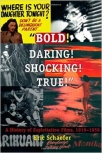David Souter, the stealth candidate that was elevated to the Supreme Court because Poppy Bush thought he was a "dyed-in-the-wool conservative" (i.e., abortion opponent) is leaving the court. This is a surprise move in some ways, since most of those guys stick around until their arteries resemble cement sticks instead of plumbing pipes, but I guess he's earned a rest back in the mountains of New Hampshire while he's still young enough to enjoy himself.
But here's what we'll miss. Justice Souter was the pivotal vote on so many issues that we hold dear:
Souter was a key vote in a 5-4 ruling in 1992, Planned Parenthood of Southeastern Pennsylvania v. Casey, which upheld abortion rights. He voted twice, in 2000 and 2007, to strike down bans on a mid-term abortion method that critics call "partial birth" abortion.But probably the decision for which he will be remembered by history was one where he was on the losing side:
He was a vigorous voice in favor of the separation of church and state. In 2005, he wrote the 5-4 court opinion striking down the posting of the 10 Commandments in two Kentucky courthouses. He wrote that the Constitution requires "the government to stay neutral on religious belief, which is reserved for the conscience of the individual."
He voted, in the dissent, against government programs that would allow public money for school "choice" programs that helped parents pay for religious schools.
Like his predecessor Brennan, Souter was a consistent vote against the death penalty. In a 2006 case, he wrote a powerful dissent when the majority upheld a law requiring the death sentence for a convicted murderer if jurors found that the aggravating circumstances of the crime, such as its brutality, equaled the mitigating factors, such as the defendant's troubled background.
Souter called the law "morally absurd" and also stressed that advances in DNA should prompt the court to be wary about state capital sentencing policies.
Souter, joined by other liberals and swing vote justice Anthony Kennedy, also voted to allow Guantanamo detainees to get a hearing in regular federal court rather than be subject only to executive branch screening.
When the justices by a 5-4 vote in Bush v. Gore stopped ballot recounts in Florida and ensued George W. Bush's victory over then-Vice President Al Gore, Souter wrote a caustic dissent about the majority's intervention in a state matter.So it's goodbye to Justice Souter, and thank you. It's striking to think about the kind of society we'd live in today if he had not been there for that pivotal vote in so many cases.
"If this court had allowed the state to follow the course (of past cases), it is entirely possible that there would ultimately have been no issue requiring our review, and political tension could have worked itself out in Congress," he wrote. After the decision was announced on Dec. 12, 2000, Souter left the court looking ashen and it seemed the ordeal of Bush v. Gore disheartened him even more about the political ways of Washington.
And it's also painful to realize that if he'd been in the majority on a couple of those cases (Bush v. Gore, anyone?) how much better off we'd be today.
This is why, in a nutshell, a president's appointments to the Supreme Court are SO important, yet are given short shrift when it comes to evaluating a presidential candidate. I mean Jesus Fucking Christ, how many people voted for Baby Doc Bush because he seemed like a guy you could have a beer with????
Obama's methods for choosing to fill Souter's seat on the bench bear close watching. He's already "reaching across the aisle", which is a bad sign. Those people will not cooperate unless they get some wingnut wackjob "strict construction" fundamentalist on the bench, so there's really not much point to reaching out to them. It's like reaching out to a mad dog. It's only going to hurt you.











0 Comments:
Post a Comment